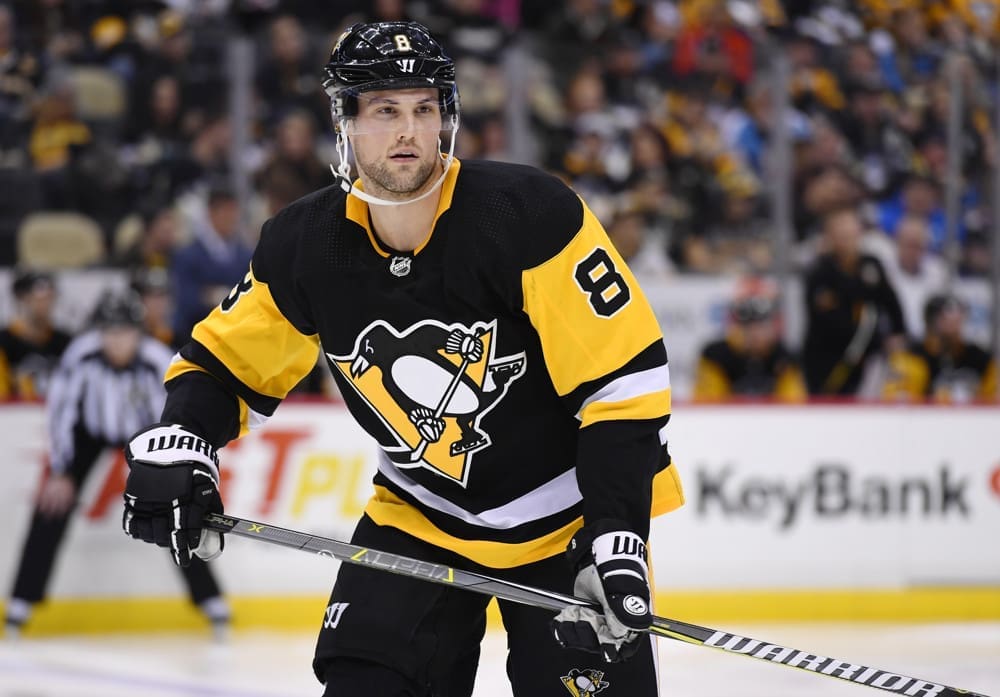Penguins
Penguins’ Goal For Game 2 vs. Capitals? Tighten Up, Sync Up
If you’re a Penguins fan, there wasn’t a lot of beauty to savor in Game 1 beyond the final score.

Beyond that 3-2 final score, there wasn’t a lot of beauty to savor in Thursday’s Game 1 if you’re a Penguins fan.
Matt Murray made a handful of spectacular saves and the crimson-clad Capitals fans left Capital One Arena quietly, so there was some eye candy for the Pittsburgh audience, but even the three-goal rally in the third period was courtesy of two deflections and a pass that Alex Ovechkin should’ve intercepted before it got to Sidney Crosby.
(Come to think of it, there was something poetic about that tying score, wasn’t there?)
The underlying numbers didn’t look awesome for the Penguins, either. They accounted for just 42 percent of the even-strength shot attempts — their lowest rate against the Flyers was 45 percent — and they were out-chanced (30-26 per Natural Stat Trick) for just the second time in six playoff games.
In reviewing the tape from Game 1, though, the Penguins did a fine job keeping those numbers as close as they were, considering how discombobulated they looked in the early going. The Capitals may have struck first on Evgeny Kuznetsov‘s breakaway goal, but the Penguins were OK with how they took advantage of some Washington wobbles, even if they didn’t score in the opening 40 minutes.
“Both teams generated some chances,” Crosby told reporters after the final buzzer. “It was pretty even both ways. Any playoff series is about getting better every game. That’s a challenge both teams face.”
For the Penguins, their goal must be to improve synchronicity between their defensemen and forwards. Both Capitals goals Thursday were the result of D-men pinching and getting no help. Not that the men up front were solely to blame, either.
“That’s something we gotta clean up,” said Brian Dumoulin, who was notably caught up ice for the Kuznetsov goal. “We can’t give them that many odd-man chances. They did a good job chipping pucks out and playing to their speed, but that’s something we can clean up.”
Interestingly enough, the forward line of Crosby, Jake Guentzel and Patric Hörnqvist was on the ice for both Washington scores. Guentzel and Crosby were slow to cover on the goals against, but then that top unit generated all three Penguins goals in the third.
In the high stakes of a second-round Stanley Cup playoff series, that’s about as well as one line can do in making up for previous mistakes.
“You can’t get down,” Guentzel remarked. “There are going to be highs and lows through the whole series. You never want to give up a goal on the first shift. We’ve got to be better. It’s tough to come back from, a little bit. A little demoralizing.”
If it was a downer to get behind right away, then it didn’t take long for the Penguins to rebound. Riley Sheahan missed the net point-blank on the next shift, followed by Grade-A looks for Crosby, Guentzel and Dominik Simon. Braden Holtby was strong, but the visitors weren’t dead-on with their aim on opportunities a player can usually only dream about getting in the playoffs.
That finishing fortune evened out in the third, of course, but it doesn’t sound like there was much concern between periods.
“We’re right there,” Kris Letang said, recalling the tone in the cramped visitors dressing room. “At some point they’re gonna go in. We’re only one shot away.”
Letang characterized his out-of-position moment on Ovechkin’s goal as a “bad-luck play.” Some analysts might disagree, but he made a salient point about where the Penguins’ confidence came from, even after a scrambling start.
“I think there’s no good lead in the NHL anymore,” Letang said. “Teams are so fast, and they have so much power up front. You just gotta stay focused and play the right way and sometimes you’ll get rewarded for it.”
Crosby contended that, if there’s any time to rally back in a playoff series, it’s in the early going, before teams have made their adjustments to constrict space for attackers like himself. These teams aren’t exactly strangers, but the amplified atmosphere of the playoffs can make even the most seasoned pros do some goofy things.
“Early on, especially, you’re just focused on going out and playing and you make adjustments from there,” Crosby said. “With each game, I’m sure things will start to tighten up. … I still think there is (a feeling-out process). The playoffs are another level. Both teams probably had that in the first period.”












